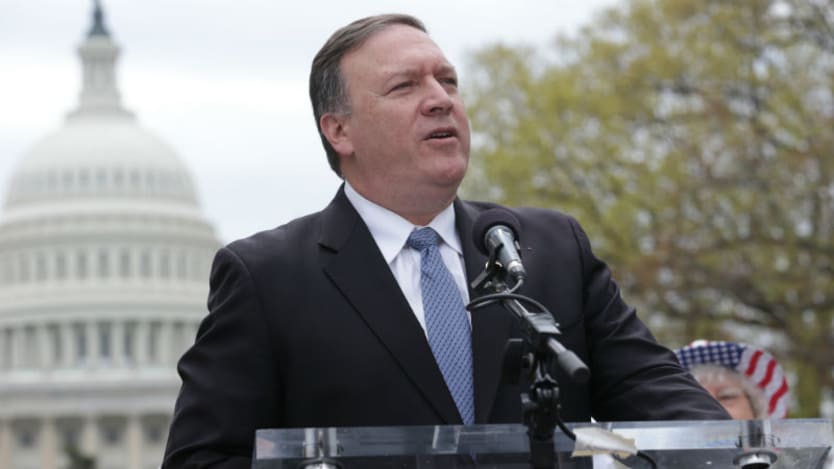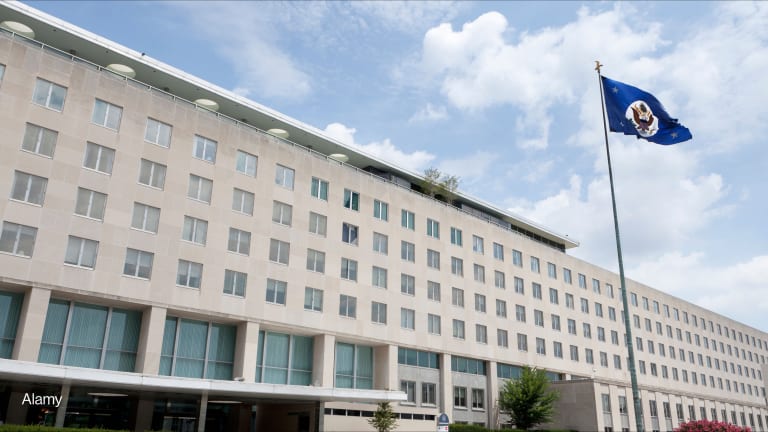
WASHINGTON — On Tuesday, United States President Donald Trump announced — via tweet — that he is replacing Rex Tillerson as secretary of state. Central Intelligence Agency Director Mike Pompeo is the president’s nominee to take over leadership of America’s foreign affairs agencies.
For a U.S. development community that has been largely disappointed by Tillerson’s tenure and approach, Pompeo’s rise represents both opportunity and risk. On one hand, aid experts who spoke to Devex welcomed the potential to see foreign affairs agencies led by someone with the ear of the president and who knows how to get things done in Washington. On the other hand, some expressed reservations that Pompeo will accelerate U.S. foreign aid’s ongoing drift towards harder-line policies and a security-first agenda.
See more Devex coverage of U.S. foreign policy under the Trump administration:
► Tillerson's firing leaves Africa trip a missed opportunity for US
► Pompeo not expected to shake up US relations at the United Nations
► Exclusive interview: Mark Green on why he is an 'optimist' about USAID
Nearly all of them agreed that replacing Tillerson with Pompeo will amount to a major leadership change with significant implications for the U.S. development community.
“Mike will be a very different secretary of state,” a source close to Pompeo told Devex. “He’s very aggressive, assertive. He’s very passionate about his work. He’s going to be a very engaged secretary of state.”
If confirmed by the Senate, Pompeo, a former congressman from Kansas who took office hailing from the conservative “Tea Party” movement, will take over U.S. diplomatic efforts and set the course for America’s development agencies and initiatives. Known as a hawkish alternative to the more moderate Tillerson, Pompeo would assume command at a time when questions around foreign aid budgets, reorganization and reform plans, hiring, and policy priorities continue to resonate from Washington, D.C., to country missions and development partners abroad.
Tillerson departs the State Department after just over a year in office, during which time he introduced a redesign effort aimed at increasing efficiency and cutting costs, but which many blame for depleting America’s foreign affairs workforce and undercutting staff morale. Tillerson took fire for failing to defend his own foreign affairs agencies against White House proposals to slash their budgets and curtail even those programs that enjoy broad bipartisan support.
The source close to Pompeo said he expects him to take a “very different approach.”
“He will outwork anyone in his entire operation every day, and people will see a fresh breath of strength and rigor, which is something that the State Department has been craving … They really want to be relevant, and Mike will make them relevant,” the source said.
The ear of the president
While Tillerson and Trump often sparred over both policy substance and style, Pompeo is a much closer confidant of the president’s. He is likely to have more White House support than Tillerson managed to garner, which is a “spectacular difference maker in the world of diplomacy,” said Lester Munson, former staff director for Senator Bob Corker on the Senate Foreign Relations Committee.
The source close to Pompeo agreed.
“Having somebody who has a close relationship with the White House, who can speak convincingly on behalf of the president, [who is] willing to take a clear stand … will be really helpful,” the source said. “I think that will just be really monumental, and a clear shift from what people have experienced for the past year.”
Munson predicted that Pompeo’s rapport with Trump also “strengthens the hand” of U.S. Agency for International Development Administrator Mark Green, and could present, “a new opportunity for people in the development world to get some new traction on things that are important — some Trump initiatives.”
At times, the State Department and USAID relationship has looked strained under Tillerson’s tenure, which, until last week, included the imposition of a hiring freeze at the agency, and the requirement that any hiring exemptions be cleared by the State Department.
In January, USAID’s leadership instructed agency staff not to participate in any joint redesign activities. A USAID official told Devex that was merely an “inartful attempt” to communicate a new phase in the redesign process, but other media reports raised alarm bells about impending “mutiny.”
“It has not been a good relationship,” said Brian Atwood, who served as USAID administrator during the Clinton administration.
In contrast, Pompeo and Green are former colleagues in the House Republican Conference — both former representatives from the midwest — and the person coordinating redesign activities at USAID, Jim Richardson, is Pompeo’s former chief of staff.
“They may not be total ideological soul mates, but they’re pretty close,” said Munson, adding that Green and Pompeo have both “thrived in the first year of the Trump administration.”
The source close to Pompeo said that while it is too early to predict what the relationship between the State Department and USAID would look like under Pompeo’s leadership, the incoming secretary’s approach is much more “hands on” than what Tillerson has shown.
“He’s going to want to hear from his senior leaders, from the head of AID, to get their viewpoints on what the right answer is before making a decision … He may not always make the decision they would like, but he’s always going to get as much input as possible, if history is any guide,” the source said.
A hard liner
Pompeo’s hard-line views on a variety of foreign policy issues have given some lawmakers and development experts cause for concern. The CIA director and former congressman’s statements about radical Islam have drawn criticism from Muslim leaders. Pompeo is also a staunch critic of the Paris Agreement on climate change. Critics describe the transition from Tillerson to Pompeo as “a former oil chief who paid lip service to climate action [being] swapped for a major beneficiary of oil money who was a vocal opponent of the Paris climate agreement.”
In a statement after Trump’s announcement of Pompeo’s nomination, Democratic Senator Chris Murphy wrote that Pompeo has “a lot of work to do to get Democratic votes” for his confirmation. “The last thing we need is a ‘yes’ man at State who views America's power exclusively through the prism of military power and covert action,” Murphy wrote.
Democratic Senator Chris Coons offered similar words of caution. “Now more than ever, our country needs a secretary of state who understands the critical role that the United States plays in advancing democracy and American values around the world,” he wrote in a statement.
Atwood, the former USAID administrator — who also chairs Devex’s board of advisers — worried that Pompeo’s policy outlook could drive even more U.S. foreign affairs professionals out of government.
“I think you’re going to see an escalation of the exodus of really good senior people leaving State, because Pompeo is seen as a hard-liner,” Atwood said.
At the same time, Atwood expressed some optimism that Pompeo — perhaps more than Tillerson — understands the concept the so-called “three Ds,” the idea that America’s defense, diplomacy, and development capabilities are mutually dependent and reinforcing aspects of U.S. foreign policy.
“The Republicans bought on to that strategy when [President George W.] Bush enunciated it for the first time,” Atwood said.
Prior to running for office, Pompeo served in the military. He graduated first in his class at the United States Military Academy at West Point, and rose to the rank of U.S. Army captain, commanding tanks at the border of the former Soviet Union. Some development leaders have hoped that Pompeo’s military experience might serve to bolster his appreciation for the role development plays in national security.
“At a time of rising global turbulence, this is the right time for a chief diplomat who fundamentally gets that the military alone cannot keep America safe,” said Liz Schrayer, president and CEO of the U.S. Global Leadership Coalition, in a statement.
Pompeo’s transition to the State Department comes as the White House is preparing to defend another round of proposals to slash the department’s — and USAID’s — budget for the 2019 fiscal year. Tillerson was scheduled to appear this week before the Senate Foreign Relations Committee to defend the president’s budget request and update lawmakers on progress toward his reorganization. That hearing has now been cancelled.
The development experts who spoke to Devex doubted that Pompeo’s rise will change a budget dynamic that has seen the White House propose massive cuts, only for Congress to mostly reject them. Pompeo is likely to understand better that development policy, in particular, results from collaboration between the executive and legislative branches of government, said Munson.
As CIA director, Pompeo has offered a few hints about how he looks at his “soft power” counterpart agencies.
“We work closely with State Department nearly every place that we operate. And it’s important that they have the resources to do that,” he said at the Center for Strategic and International Studies last year.
“We ought to talk about the mission set that we have, the resources that are required to execute that in a way that is deeply excellent, and then match the resources to fit it. And I’m confident that the State Department will end up with those resources as well,” he said.








